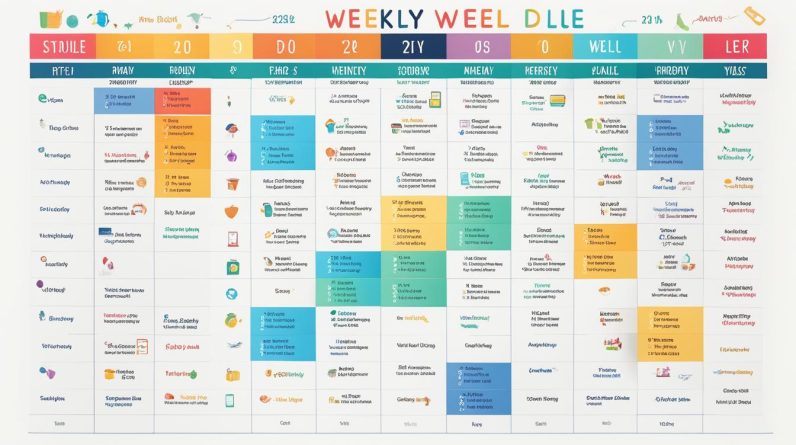Homeschooling can be financially challenging, but there are various forms of financial support available to help homeschooling families. This comprehensive guide will explore grants, tax credits, and assistance programs that can provide financial relief and resources for homeschooling expenses. Whether you’re looking for grants, scholarships, or tax credits, this guide will help you understand the different options available to support your home education journey.
Key Takeaways:
- Homeschooling families can access financial support through grants, scholarships, and tax credits.
- Unlock Math offers an online homeschool math curriculum designed to strengthen math skills and prepare students for standardized exams.
- Completing the FAFSA form is essential for accessing financial aid for college, including scholarships, grants, and work-study opportunities.
- Merit-based scholarships and need-based grants are available for homeschooling students.
- Work-study programs provide on-campus jobs to help students pay for college while gaining valuable work experience.
Unlock Math: An Online Homeschool Math Curriculum
When it comes to homeschooling, finding a comprehensive math curriculum that meets the needs of both students and parents is essential. That’s where Unlock Math comes in. As an online math program specifically designed for homeschoolers, Unlock Math offers a unique approach to building math skills and laying a strong math foundation.
Unlock Math combines the best aspects of the mastery and spiral approaches, providing students with a deep understanding of math concepts. Through scaffolded instruction, detailed solutions, and live help from experts, students receive comprehensive support every step of the way.
What sets Unlock Math apart is its emphasis on practice and self-paced learning. The program offers unlimited practice exercises to reinforce understanding and improve math skills. And with automated grading, students receive immediate feedback on their progress, allowing them to track their growth and identify areas of improvement.
To make the learning experience even more effective, Unlock Math provides access to replay videos. This means that students can revisit lessons and explanations whenever they need to clarify a concept or review a challenging topic.
Unlock Math also recognizes the importance of preparing students for standardized exams like the ACT and SAT. The program equips students with the skills they need to excel in these exams, providing them with a competitive edge in their college applications.
| Unlock Math Features: |
|---|
| Combines mastery and spiral approaches |
| Scaffolded instruction and detailed solutions |
| Live help from math experts |
| Unlimited practice exercises |
| Automated grading and immediate feedback |
| Access to replay videos |
Unlock Math truly empowers homeschooling families by providing a comprehensive online math curriculum. With its innovative teaching methods and extensive support, Unlock Math ensures that students develop a strong math foundation and excel in their math skills. Whether students need help with basic arithmetic or advanced algebra, Unlock Math has them covered.
So why settle for a one-size-fits-all approach to math education? Unlock the full potential of your homeschooling journey with Unlock Math, the online math program that is tailored to your child’s needs.
Financial Aid for College: Filling out the FAFSA
To access financial aid for college, you need to complete the Free Application for Federal Student Aid (FAFSA). This crucial form not only determines your financial need but also provides crucial information for colleges to award various forms of financial assistance. Scholarships, grants, work-study opportunities, and student loans are all potential sources of support to make your college education more affordable. Understanding the FAFSA application process and the different types of financial aid available is essential for maximizing your college funding options.
Complete the FAFSA to Unlock College Funding Opportunities
The FAFSA acts as a gateway to financial aid for college. By submitting this form, you provide colleges with the necessary information to assess your eligibility for various types of financial support. The information you provide determines your Expected Family Contribution (EFC), which helps colleges determine your financial need and allocate funds accordingly.
| Types of Financial Aid | Description |
|---|---|
| Scholarships | Meritorious awards that do not require repayment |
| Grants | Financial aid that doesn’t require repayment, based on financial need |
| Work-Study Opportunities | On-campus jobs that provide income to help cover educational expenses |
| Student Loans | Borrowed funds that must be repaid, often with interest |
Unlocking Scholarships, Grants, and Work-Study
Completing the FAFSA opens the doors to various forms of financial aid. Here’s what you need to know:
- Scholarships: Meritorious awards are available for academic achievement, athletic talents, community involvement, and more. Many colleges and organizations offer scholarships specifically for homeschooling students.
- Grants: These financial aid options are typically need-based and do not require repayment. The most well-known federal grant is the Pell Grant. Additionally, homeschooling students can apply for state and institutional grants.
- Work-Study Opportunities: By participating in the Federal Work-Study Program, you can work on campus to earn income that can be used to pay for educational expenses.
Understanding Student Loans
Student loans can provide additional financial aid options, but it’s important to approach them with caution. Unlike scholarships, grants, and work-study, loans must be repaid. Be sure to carefully consider the terms, interest rates, and repayment plans that accompany student loans. In general, it’s best to exhaust all other forms of financial aid before turning to loans.
The FAFSA is the key to unlocking various forms of financial aid that can make your college education more affordable. By completing this important form, you give yourself the opportunity to access scholarships, grants, work-study opportunities, and student loans. Understanding the different types of financial aid available and their implications can help you make informed decisions about funding your college education.
Scholarships: Merit-Based Financial Support
When it comes to financing your homeschool education, scholarships are an excellent form of financial support that you should consider. Unlike loans, scholarships do not need to be repaid, making them a valuable resource for homeschooling families. Scholarships are typically awarded based on various criteria, including academic merit, athletic achievement, community involvement, and financial need.
Many colleges and organizations offer scholarships specifically tailored to homeschooling students. These scholarships can be automatic upon admission or may require additional applications. To find scholarships that match your student’s qualifications and interests, you can utilize online scholarship search engines, reach out to local organizations, or explore professional associations related to your student’s areas of interest.
By securing scholarships, you not only receive financial assistance but also gain recognition for your student’s achievements and dedication. Scholarships provide an opportunity to support your child’s educational pursuits and ease the financial burden of homeschooling.
Resources for Finding Scholarships
Here are some resources you can consider for finding scholarships:
- Online scholarship search engines: Websites such as Fastweb, Scholarships.com, and CollegeBoard offer comprehensive databases of scholarships available to homeschooling students.
- Local organizations: Check with community organizations, clubs, and businesses in your area for scholarship opportunities. Some organizations may offer scholarships specifically for homeschoolers or students with unique talents and interests.
- Professional associations: Research professional associations related to your student’s areas of interest. These associations often provide scholarships to encourage and support students pursuing careers in their fields.
“Scholarships provide an opportunity to support your child’s educational pursuits and ease the financial burden of homeschooling.”
When applying for scholarships, be sure to carefully review the eligibility requirements and application deadlines. Keep in mind that competition for scholarships can be fierce, so it’s essential to highlight your student’s exceptional qualities, achievements, and dedication in the application process. Taking the time to craft a compelling essay and gather strong letters of recommendation can significantly increase your student’s chances of receiving scholarship awards.
Remember, scholarships not only alleviate financial strain but also recognize your student’s hard work, talent, and potential. By actively seeking out scholarships and submitting strong applications, you can open doors to additional resources and opportunities to support your homeschooling journey.
Grants: Need-Based Financial Aid
Grants can be a lifeline for homeschooling families facing financial challenges. Unlike loans, grants do not need to be repaid, making them an attractive option for funding your child’s education. Grants are awarded based on financial need and provide valuable support to help cover educational expenses. Let’s explore the different types of grants available:
Pell Grants
Keyword: Pell Grants
The Pell Grant is one of the most well-known federal grants, designed to assist students with exceptional financial need. While traditionally associated with traditional college students, homeschooled students are also eligible to apply. Pell Grants are awarded by the U.S. Department of Education and can reach up to $6,495 for the 2021-2022 academic year, depending on your financial need and enrollment status. These grants can significantly alleviate the financial burden of homeschooling expenses and help create opportunities for your child’s education.
State Grants
In addition to federal grants, many states offer their own grant programs to support education. These state grants are often need-based and can provide valuable financial assistance to homeschooling families. The eligibility criteria and award amounts vary by state, so it’s important to research the grants available in your state and understand the application process.
Institutional Grants
Many colleges and universities provide institutional grants to students, including homeschooled students. These grants are awarded by the school itself and are based on a combination of financial need, academic achievement, and other factors. Institutional grants can be a significant source of financial aid, so it’s important to explore the options offered by the schools your child is interested in attending.
TEACH Grant
If your child is considering a career in teaching, they may be eligible for the Teacher Education Assistance for College and Higher Education (TEACH) Grant. This grant program provides financial assistance to students who are pursuing a teaching career in high-need fields. To qualify for the TEACH Grant, students must agree to teach in a high-need field at a low-income school for a certain number of years after graduation. The TEACH Grant can provide up to $4,000 per year to help cover educational expenses.
By exploring these grants, you can find valuable financial support to ease the financial burden of homeschooling and ensure your child receives a quality education. Grants can provide the funding you need to invest in curriculum, resources, and educational experiences that will enrich your child’s learning journey.

Work Study: On-Campus Jobs for Financial Aid
Work study is a valuable form of need-based financial aid that offers students the opportunity to earn money through on-campus jobs while pursuing their college education. With work study, you can gain practical work experience, alleviate college expenses, and develop valuable skills that will enhance your future career prospects.
As an undergraduate student, you have the advantage of being paid an hourly wage for the work you perform, which can be used to help pay for tuition fees, textbooks, or other living expenses. Work study not only provides financial support but also allows you to gain hands-on experience in a professional environment, which can greatly enhance your resume and future job prospects.
The Benefits of Work Study
- Financial Assistance: Work study provides you with an opportunity to earn money to help cover the cost of college expenses.
- Work Experience: By participating in on-campus jobs, you gain practical work experience that can set you apart from other graduates.
- Flexible Scheduling: Work study jobs often offer flexible hours, allowing you to balance your work responsibilities with your academic commitments.
- Professional Development: Through work study, you can develop valuable skills such as time management, communication, teamwork, and problem-solving.
Work study jobs are available in various departments and offices within your college or university. These jobs can include positions in administrative offices, libraries, research labs, campus organizations, and more. It’s important to explore the available opportunities and find a job that aligns with your interests and career goals.
How to Participate in Work Study
To participate in work study, follow these simple steps:
- Complete the FAFSA: The Free Application for Federal Student Aid (FAFSA) is the first step in determining your eligibility for work study and other forms of financial aid.
- Review Your Financial Aid Package: Once you receive your financial aid package, check whether work study is included. If it is, you can proceed with finding a work study job.
- Visit Your College’s Career Services Office: Your college’s career services office can provide you with information on available work study opportunities, help you with your resume, and prepare you for interviews.
- Apply for Work Study Jobs: Apply to the on-campus jobs that interest you, and highlight your skills, experience, and passion in your application materials.
- Complete the Hiring Process: If selected for a work study position, complete any required paperwork, attend orientation sessions, and familiarize yourself with your job responsibilities.
- Balance Work and Academics: Once you start your work study job, remember to prioritize your academic commitments and establish a schedule that allows you to excel in both areas.
Participating in work study can be a rewarding experience that not only supports your financial needs but also helps you develop valuable skills and gain real-world work experience. Embrace this opportunity to make the most of your college journey and prepare for a successful future career.

Loans: Repayable Financial Aid
Loans are a valuable form of financial aid for students, but it’s important to understand the different options and implications before deciding to borrow. Student loans must be repaid over time, typically after completing your education. There are two main types of student loans: federal loans and private loans.
Need-Based Federal Loans
Need-based federal loans are a common choice for students who require financial assistance. These loans are based on your financial need, as determined by the information provided on your Free Application for Federal Student Aid (FAFSA). The amount you can borrow is determined by factors such as your family’s income and the cost of attendance.
Table 7.1: Types of Need-Based Federal Loans
| Loan Type | Interest Rate | Description |
|---|---|---|
| Subsidized Direct Loan | Fixed interest rate, currently 2.75% | For undergraduate students with financial need. The government pays the interest while you’re in school. |
| Unsubsidized Direct Loan | Fixed interest rate, currently 2.75% for undergraduates | Available to undergraduate and graduate students regardless of financial need. Interest accrues from the time the loan is disbursed. |
These federal loans generally have lower interest rates and more favorable terms compared to private loans. Additionally, federal loans offer flexible repayment options, such as income-driven repayment plans, which adjust your monthly payment based on your income and family size.
Private Loans
Private student loans are offered by private lenders, such as banks or credit unions. Unlike federal loans, private loans typically require a credit check and may have higher interest rates. The terms and conditions vary depending on the lender.
While private loans can provide additional funding, they should be considered as a last resort after exploring other financial aid options. It’s important to carefully review the terms and compare offers from different lenders to choose the most favorable option.
When considering private loans, it’s crucial to pay attention to the interest rates and repayment terms. Private loans may have variable interest rates, meaning they can change over time, potentially increasing your monthly payments. Understanding the repayment options and having a plan for managing your loan repayment is crucial to avoid future financial challenges.

“Taking out a student loan is a big decision. Make sure you understand the terms and consider the long-term implications. Borrow only what you truly need and have a clear plan for repayment.”
As with any form of borrowing, it’s important to borrow responsibly and only take out what you need. Create a budget to determine how much you can afford to borrow and repay. Avoid unnecessary borrowing and prioritize your education expenses.
By understanding the different types of student loans, comparing offers, and having a plan for repayment, you can make informed decisions about borrowing and manage your loans effectively.
State Funding for Homeschooling
While funding homeschooling can be a financial challenge, many states offer various forms of financial support and incentives to assist homeschooling families. These initiatives aim to alleviate the financial burden and provide resources for homeschooling expenses. Understanding your state’s funding options, such as tax deductions, tax credits, stipends, grants, and funding for athletics, is crucial in securing financial assistance for your homeschooling journey.
Understanding State Funding Opportunities
Each state has its own approach to funding homeschooling, with unique rules and regulations governing these programs. Familiarizing yourself with your state’s educational policies and maintaining connections with district authorities will help you navigate the funding landscape effectively. Staying informed about any changes in education policy is crucial for accessing available state funding opportunities.
| Funding Options | Description |
|---|---|
| Tax Deductions | Some states provide tax deductions for homeschooling expenses, allowing you to reduce your taxable income and save money. |
| Tax Credits | Other states offer tax credits, allowing you to directly reduce the amount of tax you owe. These credits can significantly lower your overall tax burden. |
| Stipends and Grants | Certain states provide stipends and grants specifically designed to support homeschooling families. These funds can help cover educational expenses and provide financial relief. |
| Charter Schools | In some states, homeschooling families can enroll in charter schools that offer state funding and support. These schools provide additional resources and curriculum options that align with homeschooling philosophies. |
| Umbrella Schools | Umbrella schools, also known as cover schools or distance learning schools, act as intermediaries between homeschooling families and state regulations. They may receive state funding, which can be allocated to families registered with the umbrella school. |
Exploring these state funding options can significantly alleviate the financial burden of homeschooling and provide invaluable support to ensure your child’s education is both enriching and affordable.

Donations and Grants from Organizations
When seeking financial support for homeschooling, it’s essential to explore all available options. In addition to state funding, there are numerous homeschooling organizations that provide grants and accept donations to assist homeschooling families. These organizations understand the unique challenges faced by homeschoolers and are dedicated to supporting their educational journeys.
One notable organization that offers grants and assistance is the Home School Foundation. Founded in 1994, the Home School Foundation aims to provide homeschooling families with the resources and financial aid they need to succeed. The foundation offers various types of grants, including curriculum grants, disaster relief grants, and specific educational grants. These grants can help cover the costs of curriculum materials, offer support during challenging times, and address specific educational needs. By accessing grants from the Home School Foundation, homeschooling families can alleviate financial burdens and experience greater success in their homeschooling endeavors.
Another organization that supports homeschooling families is the Home School Legal Defense Association (HSLDA). While primarily known for its legal advocacy and protection of homeschooling rights, HSLDA also offers grants and scholarships. These financial resources can be used to cover educational expenses, including curriculum materials and resources tailored to the needs of homeschooling students. By providing financial assistance, HSLDA ensures that homeschooling families can access the resources they need to provide a quality education for their children.
“The support and grants offered by homeschooling organizations like the Home School Foundation and HSLDA are lifelines for many homeschooling families. These grants can make a significant difference in a family’s ability to provide a comprehensive education for their children.”
By staying informed about available grants and support from homeschooling organizations, homeschooling parents can maximize financial assistance and enhance their children’s educational experiences. Whether it’s curriculum grants, disaster relief grants, or specific educational grants, these resources empower homeschooling families to overcome financial barriers and create an enriching learning environment at home.
Finding and Applying for Grants
It’s crucial to regularly check the websites of homeschooling organizations like the Home School Foundation and HSLDA for available grants and application deadlines. These organizations typically have specific guidelines and criteria for applying, so it’s essential to carefully review the requirements before submitting an application. Additionally, subscribing to their newsletters and following them on social media can help homeschooling families stay updated on new grants and opportunities as they become available.
Keep in mind that competition for grants can be fierce due to the high demand from homeschooling families. To increase your chances of securing a grant, it’s important to approach the application process strategically. Here are a few tips:
- Thoroughly research the grant requirements and ensure that your application meets all the necessary criteria.
- Highlight any unique circumstances or educational needs that make your family stand out.
- Provide detailed information about how the grant will positively impact your homeschooling journey.
- Include any supporting documents or testimonials that strengthen your application.
By taking the time to find and apply for grants from homeschooling organizations, you can access valuable financial assistance and resources that will enhance your homeschooling experience.
Remember, financial support from these organizations goes beyond monetary assistance. It represents a community of like-minded individuals dedicated to the success of homeschooling families. By utilizing the grants and support available, you can create an enriching and fulfilling educational environment for your children.
| Organization | Grants Offered | Focus Area |
|---|---|---|
| Home School Foundation | Curriculum grants, disaster relief grants, specific educational grants | Financial support for homeschooling families |
| HSLDA | Grants, scholarships | Legal advocacy and financial aid for homeschooling families |
Financial Support for Gifted and Special Needs Homeschooling
Homeschooling can provide a tailored and supportive environment for gifted and special needs students. The good news is that there are financial support options available to assist with their education. Some states, like North Carolina, offer specific grants and financial assistance for homeschooled children with special education needs. One such program is the North Carolina State Education Assistance Authority (NCSEAA) which provides up to $8,000 per year for homeschooled special children.
These funds can be used to cover various qualified expenses, including tuition fees, specialized curriculum, and even occupational therapy. By taking advantage of these resources, homeschooling parents can ensure that their gifted or special needs children receive the necessary support to thrive academically and personally.
If you are considering homeschooling your gifted or special needs child, it is important to explore the financial support options available in your state. Research programs like the NCSEAA and other local resources to find grants and assistance that can help alleviate the financial burden of special education expenses. With the right financial support, you can create a nurturing and enriching homeschool environment that caters to the unique needs of your child.
FAQ
What is homeschooling?
Homeschooling is the practice of educating children at home instead of sending them to a traditional public or private school. Parents or guardians take on the role of the teacher, providing instruction and facilitating learning within the home environment.
Is financial support available for homeschooling?
Yes, there are various forms of financial support available to help homeschooling families. These include grants, scholarships, tax credits, educational savings accounts, and assistance programs.
How can I find grants for homeschooling?
To find grants for homeschooling, you can explore resources such as homeschooling organizations, state education departments, and grant databases. Additionally, some organizations offer specific grants for homeschooling families, so it’s worth researching and reaching out to them directly.
Are there scholarships available for homeschooling students?
Yes, many colleges and organizations offer scholarships specifically for homeschooling students. These scholarships may be based on academic merit, athletic achievement, community involvement, or financial need. You can use online scholarship search engines, local organizations, and professional associations to find scholarships that match your student’s qualifications and interests.
Can I get financial aid to cover homeschooling expenses?
While financial aid options specifically for homeschooling expenses may be limited, there are other forms of financial support available. You may be eligible for tax credits or deductions related to educational expenses, or you can explore alternative resources such as grants and scholarships.
How can I access state funding for homeschooling?
Each state has its own approach to funding homeschooling, so it’s important to research and understand the specific rules and regulations in your state. Some states offer tax deductions or credits, stipends, grants, or funding for athletics. Staying informed about changes in education policy and maintaining connections with district authorities can help you access state funding opportunities.
Are there financial support programs for gifted or special needs homeschooling?
Yes, some states provide specific grants and financial support for homeschooling students with special needs or those who are gifted. These programs can help cover expenses such as tuition fees, curriculum materials, and specialized therapies. It’s important to explore the resources available in your state to support the unique needs of your child.
What is the Free Application for Federal Student Aid (FAFSA)?
The FAFSA is a form that students must complete to access financial aid for college. It determines your family’s financial need and provides colleges with the necessary information to award scholarships, grants, work-study opportunities, and student loans. It’s important to understand the application process and deadlines, as well as the different types of financial aid available to make college more affordable.
What is work study and how does it help with college expenses?
Work study is a form of need-based financial aid that provides students with on-campus jobs to help pay for college. Undergraduate students are paid an hourly wage, which can be used towards tuition or other living expenses. Work study not only helps students financially but also provides valuable work experience. Students can gain professional skills, build their resume, and earn money to support their education.
Are there loans available for homeschooling expenses?
While there may not be specific loans available for homeschooling expenses, students can access federal student loans or private student loans to help cover educational costs. It’s important to consider loans as a last resort after exploring other forms of financial aid. Federal loans generally have lower interest rates and more flexible repayment terms compared to private loans.
Where can I find homeschooling grants and donations?
Homeschooling organizations like the Home School Foundation and HSLDA offer various grants to support homeschooling families. These grants can be used to cover curriculum expenses, provide disaster relief, and support specific educational needs. It’s important for homeschooling parents to explore these resources and stay informed about available grants and support from organizations to maximize financial assistance.






